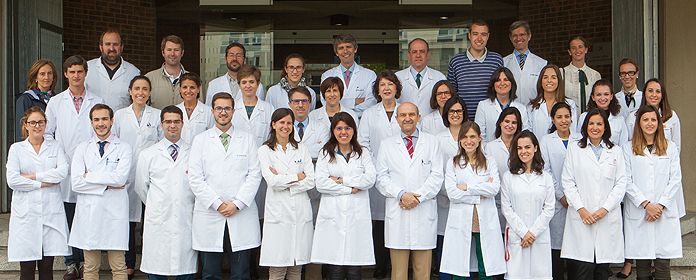Regular consumption of sugary soft drinks associated with increased risk of breast cancer in postmenopausal women
The study, conducted at framework of the project SUN (University of Navarra Follow-up), is published in the 'European Journal of Nutrition'.

Researchers from the School of Medicine have identified that regular consumption of sugary soft drinks is significantly associated with an increased risk of developing future invasive breast cancer in postmenopausal women. The study was conducted at framework of the project SUN (University of Navarra Follow-up) by group of research Ciberobn de Medicina Preventiva-Navarra and is published in the European Journal of Nutrition.
The work has assessed more than 10,000 women, who have been followed up for a average of 9.9 years and with a median age of 33 years from the SUN cohort and without breast cancer at the time of recruitment. During follow-up, 100 cases of breast tumor were confirmed. Among postmenopausal women who consumed sugary soft drinks on a regular basis, a significantly higher incidence of breast cancer was observed compared to those who did not or only occasionally consumed sugary soft drinks. Likewise, no association was found in premenopausal women. However, the authors caution that larger longitudinal programs of study is needed to support this conclusion.
Possible answers to the relationship between sugar-sweetened soft drinks and cancerOther programs of study carried out in the USA and Australia had found similar results, according to Alfredo Gea, professor at School of Medicine and researcher of Ciberobn. "The sugar contained in sugary drinks could act, among other mechanisms, by increasing the concentration of insulin in the blood, and directly on breast tissue cells. There are several mechanisms by which the consumption of sugary soft drinks can promote the proliferation of breast tissue cells, and favor the invasiveness and migration of tumor cells."
Higher insulin concentrations would also promote peripheral transformation of androgens to estrogens in postmenopausal women. "It is well known that higher concentrations of circulating free estrogens in postmenopausal women increase the risk of breast cancer. There are, therefore, mechanisms that could explain the results found," explains Andrea Romanos, signatory of article and fellow of the association Spanish Cancer Association (AECC).
According to Estefanía Toledo, co-director of group of the Ciberobn of Navarra, these results provide "new evidence to support public health strategies" aimed at reducing the consumption of sugary drinks at the population level, while for Miguel Ángel Martínez-González, researcher principal of project SUN, this is one more reason why it is no exaggeration to say that sugary soft drinks are like a "curse" that has befallen humanity.
